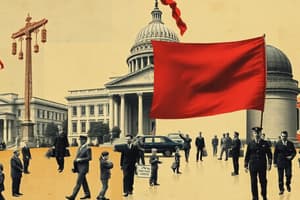Podcast
Questions and Answers
कोणत्या प्रकारची सरकार एकटील निर्णय करणारे असतात?
कोणत्या प्रकारची सरकार एकटील निर्णय करणारे असतात?
- मोनार्की (correct)
- लोकशाही
- प्रेसिडेंशियल प्रणाली
- शासकीय उपस्थिती
एक देशाचा 'संविधान' कोणती वस्तु पाहतो?
एक देशाचा 'संविधान' कोणती वस्तु पाहतो?
- राष्ट्रपती
- पुरावे (correct)
- संसद
- मंत्रिमंडळ
'प्रतिनिधी लोकशाही' म्हणजे काय?
'प्रतिनिधी लोकशाही' म्हणजे काय?
- प्रतिनिधींमध्ये सर्व मतदात्यांचा भाग घेणे
- निवडून निर्वाचित नेते (correct)
- मंत्रिमंडळ
- राजकीय पक्ष
'पोलिटी' का अर्थ 'राजकीय' संरचना संकल्पना म्हणतात का?
'पोलिटी' का अर्थ 'राजकीय' संरचना संकल्पना म्हणतात का?
'मननीय प्रमुखमंत्री' कोणती प्रकृती सरकार संचालित करतो?
'मननीय प्रमुखमंत्री' कोणती प्रकृती सरकार संचालित करतो?
संविधान काय म्हणजे?
संविधान काय म्हणजे?
निर्वाचन प्रणाली किती प्रकारे असते?
निर्वाचन प्रणाली किती प्रकारे असते?
पक्षप्रमुख राजकीय कला कोणती गोष्ट करते?
पक्षप्रमुख राजकीय कला कोणती गोष्ट करते?
समरसता कोलौंसिलेशन हे कोणत्या प्रकारे समावेश करते?
समरसता कोलौंसिलेशन हे कोणत्या प्रकारे समावेश करते?
'पोलिटिकल पार्टी' म्हणजे कोणती गोष्ट?
'पोलिटिकल पार्टी' म्हणजे कोणती गोष्ट?
Flashcards are hidden until you start studying
Study Notes
Polity refers to the arrangement of power within a state, particularly regarding how it is structured, divided, controlled and exercised. It encompasses various aspects such as governance, constitutional structure, legislative processes, executive functions, judicial institutions, administrative bodies, and electoral procedures. Here we will explore some key components of polity, including different types of government systems, constitutions, voting systems, political parties, and the concept of separation of powers.
Government Systems There are several common forms of government, each differing based on who has ultimate decision making authority. These range from monarchies where one person rules, through democratic republics with elected leaders, to presidential systems headed by an individual leader directly chosen by voters. Each system comes with its own advantages and disadvantages, but all aim to establish and maintain civil order while promoting the public welfare. In modern states, representative democracy is often used so citizens can participate without having to take part in daily governing activities themselves.
Constitution A country's constitution defines what laws apply nationally, which determines local lawmaking abilities. Constitutions outline rights and protections for individuals; define relationships between federal and state governments; describe how officials are selected; determine whether a president serves for life or can only serve for a fixed term; set up courts and their jurisdictions; list the powers delegated to national government; and detail other important matters like whether there should be freedom of speech or press. A well-written constitution provides guidance for citizens about what they can do politically, helps ensure justice under law, helps regulate society, protects people against arbitrary government actions, outlines the roles of various branches of government, and specifies the manner in which laws are changed or repealed.
Voting Systems Political participation plays a major role in maintaining a healthy democracy. Voters cast ballots during elections held periodically at both local and national levels. There are different methods of casting votes, ranging from secret or open ballot systems, majority vote, proportional representation and more. Also, electronic voting systems have been developed that allow people to register, find polling locations, view sample ballots online, verify registration status electronically, receive election information via email or text message, track mail-in absentee ballots, obtain results quickly after close of polls, and review all steps taken before, during, and after an election.
Political Parties Partisan politics involves building organizations whose primary goal is winning votes and gaining positions within government structures. Political party candidates usually share policy objectives, and many times belong to broad ideological camps like left wing or right wing. Within these groups, there may be coalitions formed among smaller parties sharing similar views; sometimes, larger parties break into factions over operational issues or personality clashes. Regardless, these competing interests help shape policies and influence outcomes of legislation through negotiations, compromise and lobbying efforts.
Separation of Powers The doctrine of separation of powers establishes checks and balances. This ensures that onerous decisions don't get made because one group wants something bad enough - it means that if two separate agencies make opposite rulings, then clearly neither agency had full proof evidence in support of their position. For example, if Congress were allowed to tax and spend without limits, then any money collected could simply be spent on whatever Congress wanted - this would lead nowhere good! But when Congress tells the President to collect taxes and spends them responsibly, you know he won't be wasting your hard earned cash.
In conclusion, polity is a complex and multifaceted aspect of societal organization. Understanding different elements of a polity, such as government systems, constitutions, voting systems, political parties, and the principles behind separation of powers, can give a clear picture of how societies work together to achieve goals and manage change effectively.
Studying That Suits You
Use AI to generate personalized quizzes and flashcards to suit your learning preferences.




